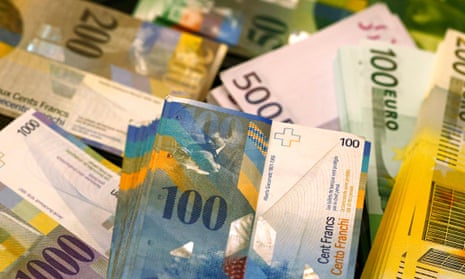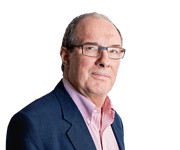The world’s biggest banks had been steeling themselves for months before the US Department of Justice’s rulings on manipulation in the foreign exchange markets. Last week’s announcement was, if anything, less tough than expected; £3.7bn of fines were levied on top of those announced last autumn, to bring the grand total to an astounding £6.3bn. Crucially, the banks also admitted that what they had done was criminal. The US attorney general, Loretta Lynch, declared that foreign exchange traders had exhibited “breathtaking flagrancy” in setting up a group they called “the cartel” to manipulate the market between 2007 and the end of 2013. The fine was “commensurate with the pervasive harm done. And it should deter competitors in the future from chasing profits without regard to fairness, to the law, or to the public welfare”.
Put bluntly, the world’s most prestigious banks had brazenly and systematically ripped off their clients. It was the crime of the decade. Yet the markets had been expecting worse. Only a month ago, Deutsche Bank had paid a record £1.6bn fine for manipulating and rigging prices in the currency and money markets. If this was the benchmark, thought the markets, the fines for other banks would be higher. As it was, £3.7bn seemed almost modest and the share prices of Barclays, RBS, Citigroup and JP Morgan rose sharply in relief.
The hope in the banking world is that the worst may be over. The combination of modestly increased regulation, stronger internal compliance and clawing back pay and bonuses if there has been malpractice – together with genuine determination at board level to root out criminal practice in dealing rooms – should begin to make a difference.
Yet will it be enough? Our grandparents, less in hock to today’s ruling doctrines – that markets can be presumed to be infallible and egoism is always beneficial – were wiser about how to organise markets than today’s economists and regulators. It is striking, despite record fines and the sacking of the Bank of England’s head of foreign exchange operations, who knew about the collusion but never drew it to the authority’s attention (on the grounds that whistleblowing was not part of his duties), that the British approach is still softly, softly.
Minouche Shafik, deputy governor of the Bank of England, expressed her horror at the casual “misconduct” among traders and the language they used to justify what they did in a speech to the London School of Economics last autumn. (Shafik is in charge of the fair and effective market review that will propose changes to the foreign exchange markets.) She conceded that no one can talk any more of a few bad apples – the barrel is rotten. But while recognising that deep change was necessary, her proposed areas for potential remedial action are largely technical. Tonally, her comments reminded me of the infamous Bischoff report into the banking system in 2008/9, which, despite the narrowly averted banking collapse, recommended as little as possible should be done to reform the City.
In fairness, Shafik spoke before last week’s admissions of criminality. The US Justice Department has raised the stakes. What everyone has to confront is that the banks have been party to an organised, global criminal conspiracy to defraud their clients. Traders colluded in secret online chatrooms to time the buying and selling of huge amounts of foreign currency to benefit each other. As one said: “If you ain’t cheating, you ain’t trying.” The entire framework, and the economic philosophy that supported it, has been found wanting.
In terms of structure, the foreign exchange markets are the closest to a Thatcherite nirvana that has ever been devised. Governments do not manage rates to comply with an internationally agreed system, as they did after the war. The price of a pivotal financial asset is determined wholly by private supply and demand. The market makes its rules. There has been close to zero public regulation. Banks buy and sell on their account freely and for their clients. Conflicts of interest abound. The pursuit of profit is the only hallowed value.
The argument in favour of this is that it is vital for the promotion of world trade and prosperity, but daily turnover on the foreign exchange markets dwarfs the volume of world trade. To paraphrase Adair Turner when chair of the now-abolished Financial Services Authority, much of this turnover is plainly neither socially useful nor promotes public welfare. It does, however, enrich those who trade in it and, as we see, criminally.
For 30 years, the doctrine has been that state involvement would be counterproductive. Modern companies, of which banks are a sub-set, have been encouraged to define themselves not as organisations delivering economic and social good, but as profit-making machines for anonymous, tourist shareholders. Managers did not question their trading teams too hard: they knew how important the profit was to their bonuses and to the bank. As for the teams, they were prepared to trade themselves – moving from bank to bank, depending on whoever paid them best. They were not an integral part of great organisation: they were, and are, boys on the make.
In a letter to all the CEOs of Fortune 500 companies, Larry Fink, head of BlackRock Asset Management, the biggest in the world, deplored the short-term financial priorities of modern corporations, which he said had lost their way and urged a refocusing. What has happened in our currency dealing rooms is part of that story. Addressing it requires a new deal between shareholders, companies and their workforces, and between the public and the private. We need a reshaping of company law and the way companies are owned so that managers pursue less fevered, short-term amoral strategies. And we need an acceptance that in market after market there is a co-dependence between state and business.
Rather than imposing swingeing fines after the event, the state has an obligation to create, with the banks, a financial architecture in which such practices cannot happen. Conflicts of interest and opportunities for price rigging should be outlawed. Criminal currency traders should be prosecuted All bonuses should be capable of being clawed back. Currency trading should be licensed on organised, accountable exchanges.
Those rules and systems that the world’s free marketeers considered so antediluvian turn out to be wise and friendly to honest-to-god businesses. Mark Carney’s Bank of England has been quietly re-regulating mortgage finance, abandoning the free-market zealotry of the 1980s and 1990s. It should do the same in the foreign exchange markets. Our grandparents were not so stupid after all.

